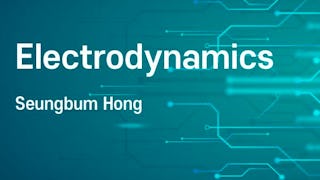Filter by
SubjectRequired
LanguageRequired
The language used throughout the course, in both instruction and assessments.
Learning ProductRequired
LevelRequired
DurationRequired
SkillsRequired
SubtitlesRequired
EducatorRequired
Explore the Electricity & Magnetism Course Catalog
 Status: Free Trial
Status: Free TrialRice University
Skills you'll gain: Basic Electrical Systems, Electrical Engineering, Torque (Physics), Physics, Electrical Systems, Engineering Analysis, Electronic Components, Mechanics, Electronic Systems, Mathematical Modeling, Applied Mathematics, Engineering Calculations, Problem Solving, Calculus, Advanced Mathematics, Trigonometry
 Status: Preview
Status: PreviewGeorgia Institute of Technology
Skills you'll gain: Electronic Components, Semiconductors, Electronics, Electrical Engineering, Basic Electrical Systems, Electronics Engineering, Engineering Analysis, Schematic Diagrams
 Status: NewStatus: Free Trial
Status: NewStatus: Free TrialCoursera Instructor Network
Skills you'll gain: Power Electronics, Thermal Management, Electrical Safety, Electrical Power, Electric Power Systems, Electronic Systems, Electrical Equipment, Electrical Systems, Embedded Software, Electronic Components, Energy and Utilities, HVAC, Basic Electrical Systems, Sustainable Technologies, Automation, Environmental Issue, Environment and Resource Management, Environmental Regulations, Environmental Engineering and Restoration, Geospatial Information and Technology
 Status: Free Trial
Status: Free TrialRice University
Skills you'll gain: Torque (Physics), Physics, Electrical Engineering, Basic Electrical Systems, Applied Mathematics, Engineering Calculations, Mechanics, Calculus, Engineering Analysis, Trigonometry, Problem Solving
 Status: Free Trial
Status: Free TrialRice University
Skills you'll gain: Basic Electrical Systems, Electrical Engineering, Physics, Engineering Analysis, Electronic Systems, Mathematical Modeling, Problem Solving, Applied Mathematics, Advanced Mathematics, Calculus, Trigonometry
 Status: Free Trial
Status: Free TrialKorea Advanced Institute of Science and Technology(KAIST)
Skills you'll gain: Electrical Engineering, Basic Electrical Systems, Electronic Components, Electrical Systems, Differential Equations, Physics, Materials science, Engineering Analysis, Finite Element Methods, Integral Calculus, Advanced Mathematics, Scientific Visualization, Engineering Calculations, Applied Mathematics, Semiconductors, Mechanics, Energy and Utilities, Electronics, Mathematical Modeling, Calculus
What brings you to Coursera today?
 Status: Free Trial
Status: Free TrialL&T EduTech
Skills you'll gain: Environmental Social And Corporate Governance (ESG), Sustainable Architecture, Sustainable Development, Sustainable Technologies, Electrical Power, Energy and Utilities, Sustainability Reporting, Climate Change Mitigation, Electric Power Systems, Corporate Sustainability, Electrical Systems, Simulation and Simulation Software, Innovation, Environment, Transportation Operations, Architecture and Construction, Architectural Engineering, Thermal Management, Power Electronics, Electrical Engineering
 Status: Free Trial
Status: Free TrialSkills you'll gain: Electrical Power, Electric Power Systems, Electrical Systems, Control Systems, Electrical Substation, Electrical Equipment, Energy and Utilities, Electrical Safety, Plant Operations and Management, Three-Phase, High Voltage, Applied Mathematics, Automation Engineering, Basic Electrical Systems, Low Voltage, Electrical Engineering, Mathematical Modeling, Telecommunications, Matlab, Simulation and Simulation Software
 Status: Free Trial
Status: Free TrialSkills you'll gain: Electrical Substation, Electrical Systems, Electrical Power, Control Systems, Electric Power Systems, Low Voltage, High Voltage, Electrical Equipment, Electrical Wiring, Electrical Safety, Three-Phase, HVAC, Basic Electrical Systems, Mechanical Design, Wiring Diagram, Schematic Diagrams, Construction, Civil Engineering, Safety Standards, Technical Standard
 Status: Free Trial
Status: Free TrialUniversity at Buffalo
Skills you'll gain: Personal protective equipment, Electrical Substation, Electrical Power, Electric Power Systems, Electrical Systems, Environmental Regulations, Energy and Utilities, Basic Electrical Systems, Oil and Gas, Safety Training, Electrical Equipment, Occupational Safety and Health Administration (OSHA), Hazard Analysis, Workforce Development, Billing, Sustainable Development, Safety Standards, Sustainable Technologies, Supply Chain, Regulatory Affairs
 Status: Free Trial
Status: Free TrialUniversity at Buffalo
Skills you'll gain: Electrical Substation, Electrical Power, Electric Power Systems, Electrical Systems, Energy and Utilities, Basic Electrical Systems, Electrical Equipment, Electrical Safety, Low Voltage, High Voltage, Sustainable Technologies, Emerging Technologies
 Status: Free Trial
Status: Free TrialUniversity of Colorado Boulder
Skills you'll gain: Estimation, Linear Algebra, Physics, Engineering Calculations, Applied Mathematics, Advanced Mathematics, Mathematical Modeling, Engineering Analysis, Calculus, Differential Equations, Physical Science
Electricity And Magnetism learners also search
In summary, here are 10 of our most popular electricity and magnetism courses
- Introduction to Electricity and Magnetism: Rice University
- Introduction to Electronics: Georgia Institute of Technology
- Electric Vehicle Systems and Technologies: Coursera Instructor Network
- Physics 102 - Magnetic Fields and Faraday's Law: Rice University
- Physics 102 - AC Circuits and Maxwell's Equations: Rice University
- Electrodynamics: Korea Advanced Institute of Science and Technology(KAIST)
- Renewable Energy & Power Evacuation: L&T EduTech
- Power System: Generation, Transmission and Protection: L&T EduTech
- A Practitioner's Approach to Power Distribution & Automation: L&T EduTech
- Energy Production, Distribution & Safety: University at Buffalo










